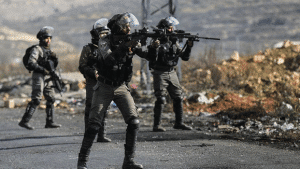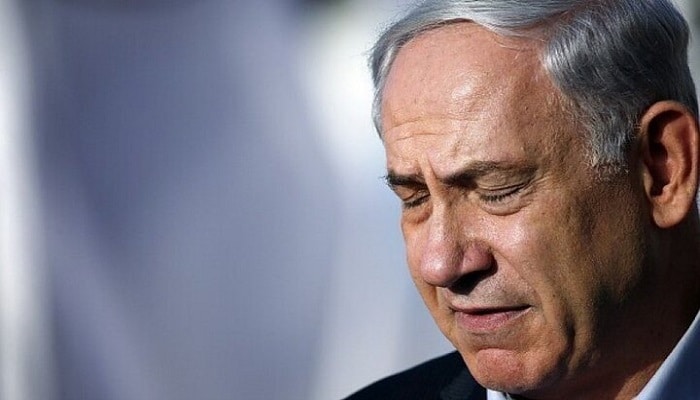PNN – The heavy military-intelligence failure of the Zionist regime against the Palestinian resistance during the historical operation “Al-Aqsa Storm” has brought Benjamin Netanyahu closer to the end of his political life.
Fifty years ago, after the joint attack of Syria and Egypt on occupied Palestine in the Yom al-Kippur war to recapture the Arab lands, a great political earthquake occurred in the Zionist regime. The surprise of the security-military apparatuses in the Ramadan war caused that in a transition period, the left parties were gradually marginalized and the right-wing parties became the main current in the political spectrum of the regime.
Now, with the occurrence of the unprecedented operation “Al-Aqsa Storm”, it seems that the foundations of the right-wing cabinet, led by Benjamin Netanyahu, have been greatly weakened. Only a few hours after the publication of the pictures of the infiltration operation of the military wing of Hamas to a depth of 24 kilometers around the Zionist regime and the announcement of the Israeli death toll, the Zionist authorities and media criticized the performance of the intelligence-security apparatus and demanded that Netanyahu step down from power. On this basis, many experts on occupied Palestinian issues talk about the increasing possibility of the end of Netanyahu’s political life and even his trial.

The judicial reform plan and increasing the gap between the Zionists
One of the important characteristics of the Zionist regime is the numerous identity gaps between the different groups present in the geography of Palestine. The divide between “Arab and Jew”, “Ashkenazi and Sephardi”, “secular and religious” and “European and African” and recently the supporters and opponents of judicial reforms have intensified the bipolar atmosphere and increased the vulnerability of Zionists.
During the past year, the streets of the cities of Tel Aviv, Jerusalem, and Haifa and… had hosted hundreds of Israelis opposing the approval of the judicial reform bills by the Zionists. At the same time, many military personnel, administrative staff, pilots, intelligence officers and reserve forces left their service or started a massive strike. This political-social difference opened the feet of foreign powers like America to this issue and caused Washington to support the opposition.

Netanyahu’s critics believe that his persistence and his right-wing allies in the cabinet are the main culprits for the increase in internal divisions, the lack of centralization of the security forces and the occurrence of the Al-Aqsa storm disaster. In other words, the instigation of the internal crisis by the leader of the Likud party created the biggest failure in the history of the military-intelligence apparatus of the Zionist regime. Of course, by pointing the finger of blame at the opposition leaders, Lapid-Gantz, Netanyahu’s supporters are trying to introduce the weekly protests as the cause of security disturbances and changing the equations of resistance. However, the public opinion of the regime blames the current cabinet for internal disputes in occupied Palestine.

Failure of information from the axis of resistance
The radical policies of the Zionist regime towards the West Bank caused the Israel National Security Institute based in Tel Aviv to assess the biggest security threat to the Zionists this year, primarily the Palestinian groups in the West Bank and the Gaza Strip.
In such a situation, the forces of the military wing of Hamas entered the occupied territories by crossing the land and sky of Gaza and controlled some areas for several days. The scope of this operation was so wide that the Israelis first put a house-to-house war on their agenda to reach the border of the Gaza Strip. Experts believe that the infiltration of the resistance into the occupied territories has destroyed the “psychological security” of the Zionists, and the process of reverse migration may increase in this region in the coming months.

Extremism of rightists and postponement of peace with Riyadh
During the last few months, the hard-line elements of the regime’s cabinet, namely the Haredi, Asmutarich and Ben Guer, by increasing security measures in the West Bank and the Al-Aqsa Mosque, provided the grounds for intensifying anti-Israel sentiments among the Arabs of the Green Line and the limited residents of the Fatah and Hamas rule. Before the start of Al-Aqsa storm operation, the experts of occupied Palestine had prepared themselves for the third intifada and the explosion of Palestinian anger. The cleansing operation of the regime army in the Jenin camp and the subsequent desecration of the Al-Aqsa Mosque by the Zionists provided the basis for the legitimate reaction of the resistance in the heart of the occupied territories. This is the same issue that was reflected in the statement of the Kingdom of Saudi Arabia in response to the current events in occupied Palestine.
The type of resistance attack and the severe blow to the regime’s security structure caused the Israeli war machine to show an emotional reaction without taking into account rational calculations and to bombard the Gaza Strip relentlessly. Yoav Galant’s cutting off of water, electricity and preventing food from entering the world’s largest open prison shows the depth of the Zionists’ humiliation.
Benefit of speech
Netanyahu’s positive response to the formation of the national emergency cabinet shows the attempt of the current prime minister of the Zionist regime to share the responsibility for the failure and to avoid being accountable to the fact-finding committee after the end of the war. Although the leader of the Likud party is fumbling, it seems that the two important missions of his cabinet, namely, dealing with the resistance and completing the process of normalizing relations with Saudi Arabia, have faced an impasse, and this issue has made his political future in serious danger.
The collapse of the psychological security of the Zionists is not an issue that is easily forgiven by the security apparatus of the regime, and Netanyahu’s political life will probably end in the medium term.

